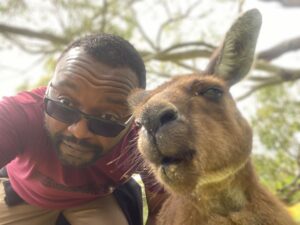As part of my growth journey, I have been reflecting on the past to understand how it has shaped who I have become today. The goal here is to learn from my experiences and set a solid foundation for the future.
I love this great quote by William Wordsworth (an 18th-century poet): “Life is divided into three terms – that which was, which is, and which will be. Let us learn from the past to profit by the present, and from the present, to live better in the future.”
How to evaluate the past
To evaluate the past, I’ve had to ask myself some tough question like:
- What mindsets or beliefs no longer serve me?
- What behaviours or actions are holding me back?
- What are the most stressful things I’ve been through?
- What are my happiest memories?
- What are your biggest failures?
- What is my biggest success?
it’s important to know these as you’ll need something to remind yourself that you are not a loser when you feel like one. - What kind of advice would I give my younger self or someone else?
- Why am I not where I want to be?
- How do I want the rest of my life to be?
This is a deep question with lots of layers…we’ll explore this in more future articles - What are the major values or principles you live by?
- What will be my legacy?
This is especially important now that I am a dad?
The 20
The 20s were certainly the most transformative years of my life. Within a decade:
- I moved countries from Kenya to Australia at the age of 20.
- I completed my computer science degree.
- I bought a house.
- I met and married the love of my life. Hands down the best thing I have done in life.
- Relocated my mother (the only other member of my nuclear family) to Australia.
- Vacationed to some of my dream destinations.
- I rose through my career fast and managed to work with worldwide brands.
- I started my first business.
The list goes on. To put it clearly, In my 20s, I made some significant headways. I felt confident (sometimes naively optimistic), in control and somehow immortal. I was on the roll.
The 30s
The 30s started slow. For some strange reason, I kinda hit my early life crisis. There were many life milestones I wanted to hit by 30 but I was nowhere close to even scratching the surface. I wonder why we put these kinds of timeline-based goals on ourselves.
Some of my bad choices of my 20s had already started catching up to me and for the first time in my life, I felt vulnerable, unsure of myself and lost.
Now, I’m normally a very optimistic person. And while this is a great trait, there is always a fine line between optimism, realism and denial. From the early to mid-30s, rather than face up to my challenges, I preferred to ignore certain aspects of my life and hope that it will work out in the end. I drowned myself with work and doing 120 hour weeks were the norm, not the exception.
It was not until the mid-30s that a lot came crashing down. Partly due to certain things being ignored for a long time and a personal tragedy I went through that I’ll share one day when I work out the courage to do so. Something had to change, I shut down my business, got myself a decent 9-5 job and decided to devote more time to my family as well as self-care, personal growth and development. That would turn out to be a great investment I’ve made on myself.
The Life Lessons
As I stare at the 40s, I feel more grounded. I’m grateful for the success and failures. I’ve learnt a lot of lessons and would love to share these with you so that you hopefully don’t have to make the same boneheaded mistakes. And even if you did, hopefully, these lessons will help you snap out sooner.
One of the most impactful books I read in 2019 was Principles by Ray Dalio. This book taught me the skill of analysing the past and present and building life principles that become part of your daily decision-making framework and life operating system.
Lesson #1: From little things, big things grow
My mother always tells me: “If you ignore little things they turn into monsters” and boy is she right. I look back at some of the simple silly things that I ignored that came back to bite big time e.g:
- The late bills that accrued interests, big fines and cost me more money than I need to pay.
- The late debts that don’t get paid in time and accrue interest and collection fees
- The relationships you ignore that turn cold.
- The list goes on
This lesson does not just apply for bad stuff, it could also work for other things. E.g. What if since I turned 20, I put aside a small insignificant amount e.g. $50 every month on a savings account or invested in a mutual fund? I would have a tidy nest egg, wouldn’t I?
See, little decisions and actions compound over time and become bigger outcomes either way. If you love a good book on this topic, go read “The Compound Effect” by Darren Hardy
Lesson #2: Pick your battles.
The one thing I have come to appreciate as I’ve gotten older is that you have a finite amount of time and energy. Therefore. you need to be very selective on how you spend it. I’ve learnt how to guard my time, energy and emotions. This has meant being selective on:
- The kinds of projects and entrepreneurial opportunities I take on board.
- The kinds of people I spend time with.
- The kinds of things I chose to care about or not waste my emotional and mental strength. E.g.
- You will not find me watching the news or keeping tabs with the daily rollercoaster of current affairs.
- I will not be wasting my emotional energy worrying about what people think about me
The hard reality is this:
- You can’t accomplish everything at once. You have to focus and prioritise.
- Every accomplishment has a sacrifice. What are you willing or not willing to sacrifice for your goals? It’s so vital to understand both.
- You cannot please everyone. Who do you want to attract in your life and who would you rather repel?
Lesson #3: The hard lessons on money and debt
Remember when I said some of my bad choices of my 20s started to catch up with me in the 30s, this is one of them.
In my early 20s, I was a good little saver and would scoff at the thought of debt. I would always pay my bills in time and always had savings.
In my mid-20s I got my first credit card against all advice from people who know better. “It will be great for the points,” I said, “I can pay it off straight after using it,” I said..yeah right? Here is the deal with debt, once you get into the first debt and get comfortable with it, your risk appetite for more debt expands. First, forward to the 30s and I find myself with lots of credit card debt, some of which have already started accruing a crazy amount of interest. For the first time in my life, I found myself living paycheck to paycheck.
The challenge with struggling financially is that it robs you the ability to think strategically and act long term. You are always making short term (sometimes bad) choices because you need to survive.
So what have I learnt about money?
- Work on your relationship with money and remove all negative mindsets you have with it.
Money is not evil, it’s a tool to help you build a life you want and have the impact you desire. - Educate yourself on money management and building wealth: how to make money, how to keep money and how to make money work for you.
- Live within your means. Stop trying to impress people who don’t matter.
Lesson #4: Life is not a destination
Do you suffer from “Destination Disease”? Here are some common symptoms:
- You regularly use statements like “I will be happy when ____ happens”, “I can’t wait for ____ so that I can _____” hope you get the gist of it. In short, you are deferring your life and happiness for something that may or might not happen in future instead of enjoying today.
- You struggle to enjoy the present moment and are constantly working or drowning yourself with distractions.
- You are a massive procrastinator.
I remember my first romantic trip to Europe with my wife. You know what was the most fun: enjoying the scenic views on our way to our destinations and the impromptu little things we would discover on the way while we were trying to get a certain attraction. Life is about enjoying the everyday moments rather than holding off for that big climatic destination. I’ve had to learn to be patient, present and mindful.
The one questions I have been asking myself a lot lately is:
“What if I was stuck with who I am forever. I couldn’t change any aspect of what I have or learn any new things. What could I do with my current skills, resources and limitations?”. This question helps me accept my current limitations, get resourceful and enjoy the present without having to wait for a certain outcome to eventuate before I can enjoy life.
Lesson #5 Ego is the enemy
One of the most impactful books I read in 2019 was Ryan Holiday’s “Ego is the Enemy”. After reading this, I had one of the most humbling and grounding experiences of my life. It caused me to reflect on the many times where my pride and ego has caused me to:
- Ignore to good advice even though deep down I knew the person advising me was right.
- Not follow instructions step by step from experts or people with a lived experience. When someone who knows better tells you how to do something, follow it to the later and modify the process to suit once you’ve mastered how to do it.
- Reject or not request help when I was struggling because I thought it would make me look weak….how dumb?
- Think of myself more than I should. Now I am not saying that you shouldn’t think highly of yourself. There is a great distinction between having high self-esteem and an inflated sense of self-worth.
Yes, it’s very crucial to cultivate healthy self-esteem but never let your ego stand in the way of living a great life.
Lesson #6: Setting and achieving goals
I have always had what Jim Collins in the book “Good To Great” calls BHAG (big hairy audacious goals). One of my biggest strengths is being able to come up with big ideas and visualise the future. That said, the gap between your present and the future lies in being able to set realistic goals and achieve them. And this is one area that I have failed miserably.
Part of the challenge has been:
- Setting unrealistic goals.
- Setting goals but not breaking them down to map out the next actions, appropriate milestones and timelines.
- Being overly optimistic and not considering factors that are not within my influence and control that can derail my goals.
- Not reviewing my goals regularly. As a result, I’ve ended up setting goals and forgetting about them entirely.
- Moving from accomplishment to accomplishment without taking time to celebrate the milestones.
- Failing to realistically account for my limitations. I’m always overly optimistic which can work can also work to your detriment.
These days, instead of planning goals haphazardly, here is the process I use (for full disclosure, I learnt this tactic from the legend, Rich Schefren from Strategic Profits)
- What is the goal?
What do I want to achieve and why? - What are the things I need to achieve this goal?
- This will help me evaluate the effort required and what success looks like?
- I’ll also try and think about what is the absolute minimum necessary to achieve this goal?
- What challenge or obstacle do I foresee?
This helps in anticipation challenges before they bite me on the back. - What are the next logical steps
- What is the fastest and easiest way to get to the goal?
Lesson #7: Build your core skills of leverage
Ever seen a video of a small card that causes the dominos to tip? Lately, I have been asking myself this question, “What core skills do I need to live a great life”. I want to find out one of two things that if I did them very well, it would make all other areas of my life simpler. After much searching, it came down to the two:
- The ability to think clearly and make good decisions.
- The ability to communicate effectively and persuade people.
The ability to think clearly and make good decisions.
Just at resting state alone, your brain consumes about 20% of your oxygen intake. What about when you are critically thinking? It’s no wonder that someone playing a game of chess will be sweating bullets without physical exercise. So, given that your brain wants to conserve energy, it’s no wonder we don’t take time to think deeply. We normally default to generalisations, past experiences and the heuristics we’ve built over time.
Bad thinking leads to bad choices which leads to an unfulfilled life. There are a lot of resources on how to think and decision making. I’ll be sharing that in another article.
The ability to communicate effectively and persuade people.
To get what you need in life, you need to have the ability to clearly communicate and influence others. By this I mean:
- How you use you speak or use your voice.
A friend and one of the world’s leading coaches on communication, Vinh Giang, taught me that your voice is an instrument, you can play it to whatever tune you want. This is the very reason I taught myself how to speak slowly and clearly. It’s very important especially if you have a different accent to your main audience. - How you use words written or spoken and how your words make other people feel.
- How you can explain things in a way that is simple to understand especially complex things.
This was hard to learn given I come from a very strong technical background and half of the stuff I do is hard enough for people to understand. - The skill of deep listening, empathy and building rapport with others.
Lesson #8: Don’t label or box yourself
It took me a while to understand this and it’s not until I understood the concept of what an Alter Ego is that I really got it. See, one mistake we make is we label ourselves and accept those labels about how we see and define ourselves e.g. you might say “I’m terrible with romantic relations”, “I find it easy to start but not follow-through” etc etc.
I used to label myself as “I am good at starting projects and not very good at follow-through and finishing them” but then it struck me. I have been in a loving romantic relationship with the same woman for 13 years. I have invested heavily on my marriage over the years. As a result, our bond has grown stronger and the kind of marriage that most people dream of. Now I don’t mean to brag but how is that for follow through? See, “John the husband” can start things and follow through. So, it would be false to entirely label me as someone who doesn’t follow through because while I am not great at follow-through in certain areas of my life, in others I am really good at it. Could I bring “John the committed husband who follows through” to my hard projects? Absolutely.
What I am trying to drive at is this, for every label you’ve assigned yourself about some perceived limitation, chances are that you already have those skills in other areas of your life.
Another thing is that you can always change things in your life that no longer serve you including your career. You don’t have to feel boxed, even if everyone knows you as the “The person who does X”. In the last 20 years, I have been:
- A primary school teacher and private tutor to high school kids.
- A disability support worker.
- A cleaner.
- A farmhand.
- A web designer.
- A bad-ass software developer.
- Ahead of IT.
- A marketer.
- The dude who is writing this blog on personal development.
- …who knows what I will be in 5 years?
If you need to change direction and are worried about confusing people who follow you, here is an easy process I’ve used:
- Make the changes and ensure a smooth transition for the people you are currently serving. E.g. When I switched my company from software development to marketing, I made sure that all my old clients had a new home.
- Bring your followers on the journey. You’ll probably lose some people along the way which is fine.
Conclusion
There are many other lessons I’ve learnt in the last 2 decades but I thought these were the most relevant and worth sharing. I hope you find my lessons useful. I hope this inspires you to go on a journey and find your own lessons and guiding principles.
Here is what you want to do next (ideally straight after reading this article):
- Do a self-evaluation. You can use the questions I used above.
- Write down your biggest lessons.
- Don’t forget to review these regularly or else they will be forgotten
I would love to know what are some of your biggest lessons. Please share in the comments below.




